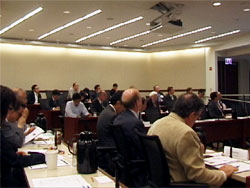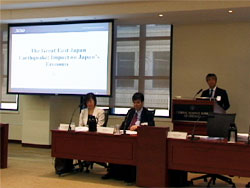Rebuilding Japan
Seminar on the Great East Japan Earthquake Informed Chicago Businesspersons of New Business Opportunities in Japan
Aug 11, 2011
On July 6th, JETRO with other panelists spoke about the importance of U.S.-Japan relations, the damage felt by Japan's infrastructure and supply chain and its recovery, and post-earthquake Japan's new business opportunities at the seminar organized by the Japan-American Society of Chicago. The seminar was entitled &quto;Japan: Road to Recovery – Challenges and Opportunities&quto; and focused on the reconstruction of Japan following the Great East Japan Earthquake. Approximately 80 people were in attendance from the following sectors: finance, law, trade, and business. The seminar was held at the Federal Reserve Bank of Chicago.
The reconstruction of post-earthquake Japan reexamines the importance of U.S.-Japan relations
The seminar outlined the goals of the reconstruction period and Japan's future business opportunities. Minister Hideki Asari of the Embassy of Japan in Washington D.C. began by expressing his gratitude to all of the countries that have aided Japan, especially for the great relief efforts of the U.S. The U.S. Armed Forces "Operation Tomodachi" (Operation Friendship) contributed greatly towards rebuilding the affected area and building temporary homes. Victims of the stricken area showed their appreciation by writing "Arigatou" (Thank you) on the shore using pine trees.

He then spoke about U.S. Secretary of State Hilary Clinton's visit to Japan, where she and U.S. Chamber of Commerce President Tom Donohue joined to endorse the safety of Japan and support Japanese business and tourism. Along with Chairman Hiromasa Yonekura of Nippon Keidanren and Foreign Minister Takeaki Matsumoto, the partnership declared, "Japan is open for business."
Minister Asari emphasized Japan's position as a key global player. He explained Japan's alliance with the U.S. as a top priority, as the Japan-U.S. Security Consultation Committee (2+2), consisting of Foreign Minister Matsumoto, Secretary of State Clinton, Defense Minister Toshimi Kitazawa, and Secretary of Defense Robert Gates, ensured the security of the region and the world. Through APEC, and with the heavy support of the U.S., Japan is looking to aggressively strengthen and rebuild its' economy, Asari explained.
Additionally, Minister Asari touched on the rapid recovery of the highways, railroads, and airports of the affected area, and then explained the goals for Japan's economic levels to recover to that of pre-disaster levels by the end of 2011. He also introduced various government measures such as methods of ceasing the nuclear disaster, developing an energy-saving design, food safety inspections, and the Reconstruction Design Council's work to revitalize the economy, establish a new energy policy, and maintaining economic partnerships.
Managing energy-efficiency and an aging society toward new business opportunities
The second speaker, Tatsuhiro Shindo, chief executive director of JETRO Chicago, mentioned the optimistic views of Japanese automotive industry executives in the U.S., since they predict a full recovery in the supply chain of the automobile parts earlier than the originally predicted period of October-December of this year.

Shindo also spoke of a "secondary economic damage" caused by the restrained consumer behavior following the disaster. Japanese citizens were reluctant to celebrate the traditional spring cherry blossom festivals by drinking sake, but a YouTube message by Mr. Kosuke Kuji, a Nanbu-bijin sake brewer, encouraged consumers to drink more sake to revitalize the economy. In May 12, JETRO Chicago held a sake promotion event in which 9 breweries from Japan visited Chicago, including Nanbu-bijin and Okunomatsu from the affected Tohoku region. They came to further strengthen the U.S. sake market despite the disaster, explained Shindo.
As energy conservation has become even more important, Shindo emphasized Japan's plan for short-term methods such as solar panels and energy storage, and long-term methods such as renewable energy and wind power. Shindo also spoke on Japan's service robotics as a leading opportunity for future business to complement Japan's aging society. An interactive robot named PARO has been introduced to the disaster victims living in shelters to help them overcome grief and restore hope into the hearts of all from young children to the elderly.
Finally, Shindo introduced an interview of Marc Grynberg, CEO of Umicore, the second largest company for cathode materials of lithium ion batteries in the world. Umicore had moved its operations to Kobe, and stayed in Japan despite the Great East Japan Earthquake. Grynberg was presented as an example of a leader of a foreign company doing business in Japan that showed strong commitment to operate in the Japanese market following the disaster.
Brand Marketing required to improve Japan's image
The final presenter was Professor Kathryn Ibata-Arens, Associate Professor of Political Science at DePaul University. Professor Ibata-Arens was in Tokyo at the time of the earthquake, and she spoke of the experience and her amazement of how none of the buildings collapsed, and how everyone was so calm. She stressed Japan's need for stronger brand marketing to improve Japan's image while rebuilding the nation. She gave an example of Uniqlo, Japan's leading clothing retail chain, which launched its "Save Japan" campaign, in which the clothing brand collaborated with worldwide celebrities to print T-shirts and donate the profits towards the disaster relief.
Chicago business were informed of Japan's current situation
Mitsukuni Baba, the host of the seminar and Executive Director of the Japan-American Society of Chicago, disclosed that since many Japan-American Society members interact and do business with Japanese companies, the attendees were seeking accurate information regarding the situation of post-disaster Japan. Although Japan's disaster was covered all over the news after the first month, news of Japan's situation had been reduced thereafter. Many attendees expressed positive attitudes after being able to look into Japan's current economic situation as well as future business opportunities.



